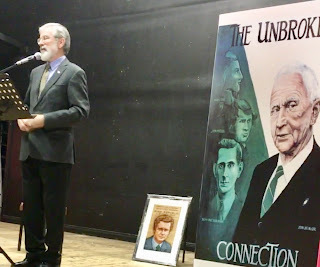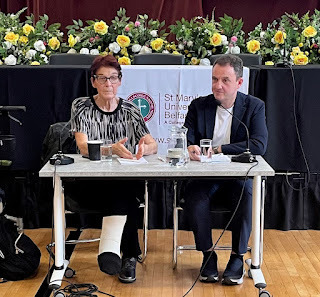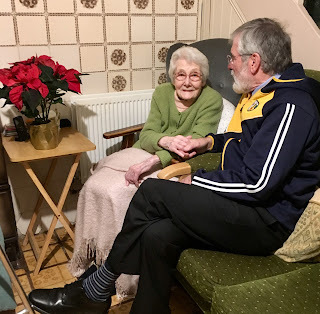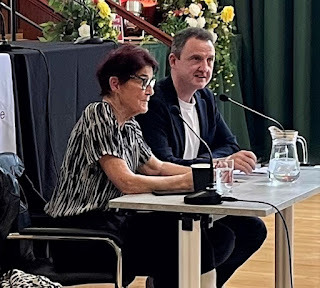John Joe McGirl – an unbreakable Fenian: A master class on campaigning
 Speaking in Ballinamore to a packed hall on the legacy of John Joe McGirl
Speaking in Ballinamore to a packed hall on the legacy of John Joe McGirlJohn Joe McGirl – an unbreakable Fenian
In the course of almost 60 years of activism I havebeen very lucky to meet many wonderful, committed, compassionate republicans.On Saturday, in Ballinamore in County Leitrim, Republicans from Leitrim andbeyond will gather to celebrate the life of one of these – John Joe McGirl. Theannual John Joe McGirl commemoration is one of the highlights of theBallinamore Festival Week and the participants will walk from John McGahernSquare to the monument to John Joe opposite Amharclann an Oileáin (the Island Theatre).The monument was designed by Robert Ballagh.
Formany of my generation John Joe was an inspiration – a legend. I first methim in the late 1960s. I was in my late teens. I had travelled by bus fromBelfast to Enniskillen one Friday evening and then hitch-hiked to Ballinamore.I slept in a field in my trusty sleeping bag and I landed in Ballinamore on aSaturday morning.
JohnJoe brought me to Sliabh an Iarainn, to Lough Allen and to Drumshambo. The coalminers in Arigna were on strike and we attended one of their meetings. John Joewas deeply committed to transforming the lives of ordinary citizens burdened bypoverty and deprivation; and his concern for rural Ireland, and for the tens ofthousands forced to emigrate, helped to shape my own politics.
Heconnected the national and the local – a lesson I have never forgotten. Beforeanyone else he understood the importance of the restoration of our inlandwaterways. He was a champion of education and a great suppkrter of libraries.He was also a strong gaeilgeoir. And like me a faithful and hopeful supporterof our respective country teams.
I also met Bridie, John Joe’s wife. They hadmarried in 1951 and had five children Liam, Áine, Cait, Feargal and Nuala.Given the frequency of John Joe’s periods in prison Bridie did a great job ofrearing the children.
Aswell as being Vice President of Sinn Féin, a former POW and a TD and arepublican activist for decades, John Joe also had a long connection withBelfast. He had the distinction of being in two different prisons when bothwere set on fire by Republican POWs. The first time was in the notoriousCurragh in December 1940 where he was savagely beaten. The second time was LongKesh in 1974. John Joe had travelled to Belfast at Easter 1974 to give theEaster Commemoration speech. The Brits thought he was Seamus Twomey and he wasarrested. When they discovered their mistake John Joe was sent to the interneeend of the Long Kesh camp.
Whenhe arrived all us internees thought – poor oul John Joe – we all felt so sorryfor him. But there was no sadness or despair in John Joe. He had been down thisroad so many times before. Later in October that year the republican POWsburned Long Kesh to the ground. There was a fierce series of running battlesthrough the night and the following morning in different parts of the campbetween the Republican POWs and the British Army. In the midst of this John Joewas hit in the face by a rubber bullet. If my recollection is right his jaw wasfractured. As flames licked around the watch-towers I made my way to John Joeand asked how he was. His response – “I’m alright as long as you peopleare alright”.
Speakinglater about his time in Long Kesh John Joe said:“I spent nine months there…Isaw young men fight hand to hand with British soldiers. I know what it means tobe kicked, beaten, gassed, made to sleep in a blanket under a sheet of iron inthe month of October. I was glad to join this new generation in writing theirchapter in the fight for independence. I am proud to say of them – that nogeneration has produced braver or better”.
JohnJoe’s entire adult life was a reflection of the years of republican strugglethrough the 1930s, 40’s, 50’s, 60’s, 70’s and 80’s. Five decades of selflesscommitment to the struggle for Irish freedom and independence. He was the ‘unbreakableFenian’, the ‘gentle soldier’.
Duringthe 1981 hunger strike John Joe travelled the length and breadth of the staterallying support for the hunger strikers. In the June 1981 general electionCiaran Doherty and Paddy Agnew were elected as TDs. Joe McDonnell came close totaking a seat in Sligo Leitrim. Despite the risk of arrest John Joe attendedhis funeral in Belfast. He gave the oration at Joe’s graveside in Milltown. Hesaid: “Joe McDonnell died rather than debase the cause he served,rather than live with the forced tag of criminality on him… We will build JoeMcDonnell a memorial… that will be the freedom and the unity of the Irishpeople.”
In1986 John Joe seconded the motion calling for an end to the abstentionistpolicy towards Leinster House. As a former abstentionist TD it was a bigdecision for him to take. It was for him a necessary step if, in hiswords, “we are not going to hand down this struggle to anothergeneration”.
MartinMcGuinness like me loved John Joe. In a tribute to him Martin described JohnJoe as a “progressive thinker, always prepared to consider, support andpropose new ways for the Republican Movement to advance. He wasn’t prepared tostand still or hold to old outdated tactics which were incapable of developingthe struggle on all fronts… He was an extraordinary man, an inspiration toeveryone who knew him. We treasure his memory”.

Ailbe Smyth with Colin Harvey
Amaster class on campaigning
Féilean Phobail was a resounding success and in particular it provided a wonderfulrange of debates and conversations on the many issues surroundingconstitutional change. Well done to Harry and Kevin, Sam and all the Féileteam. Maith sibh. The quality of the debates was excellent. All were packedout. The breadth of speakers – academics, journalists, political and communityactivists, sports people, - and the many shades of opinion, including a greaternumber than before of people from the broadly cultural Unionist/Protestanttradition, was uplifting.
Amongthese was a hugely informative conversation between human rights lawyer ColinHarvey and Ailbhe Smyth, a well known and highly respected campaigneron many social justice campaigns. Ailbhe was a key player in the successfulCoalition to Repeal the Eighth Amendment and was co-director ofTogether for Yes in 2018. She told of one of her first decisions to take astand in 1973. At that time she was a young academic in University CollegeDublin. When she got married in early 1973 UCD told her to leave. At that timethere was a bar on married women joining the civil service and if a womanmarried she had to resign. Ailbhe refused to leave. In June of that year newlegislation was introduced to lift the bar. Ailbhe stood her ground and won.
Colinand Ailbhe’s discussion centred on the role of Citizens’ Assemblies increating change and the risks and opportunities such Assemblies can present.Colin reminded us that there is a “huge political transformation taking place acrossthis island. And people across all sections of society are increasingly gettinginvolved in the conversation on our constitutional future.”
Itwas a master class from Ailbhe on how to run a campaign. The importance ofbeing inclusive, of strategising, the need to build alliances, the use oflanguage in messaging, the framing of the campaign and the managing and nutsand bolts of creating a cohesive multi-layered organisation.
Gerry Adams's Blog
- Gerry Adams's profile
- 29 followers





